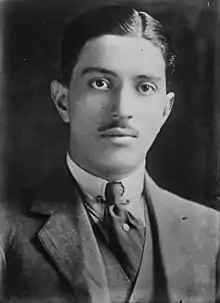Albert de Courville
Albert Pierre de Courville (1887–1960) (born in Croydon, England) was a writer and director of theatrical revues, many of which featured the actress and singer Shirley Kellogg, whom he married in June 1913.

In about 1907 he began work in London as a journalist with the Evening News.[1] A good reporter, he was soon earning as much as £20 a week, but thought there were more possibilities, and money, in the theatre. He joined forces with London impresario Sir Edward Moss and staged revues at the London Hippodrome.
In the 1930s he turned to making films. His two most famous films, both featuring Jessie Matthews were There Goes the Bride (1932) and The Midshipmaid (1932). He also directed The Wrecker, an adaptation of Arnold Ridley’s play of the same name, and Seven Sinners (1936).[2]
Selected filmography
- Wolves (1930)
- 77 Park Lane (1931)
- 77 Rue Chalgrin (1931)
- Entre noche y día (1932)
- Sous le casque de cuir (1932)
- Under the Leather Helmet (1932)
- There Goes the Bride (1932)
- The Midshipmaid (1932)
- Between Night and Day (1932)
- This Is the Life (1933)
- Wild Boy (1934)
- Things Are Looking Up (1935)
- The Case of Gabriel Perry (1935)
- Charing Cross Road (1935)
- Seven Sinners (1936)
- Strangers on Honeymoon (1936)
- Clothes and the Woman (1937)
- The Rebel Son (1938)
- Star of the Circus (1938)
- Oh Boy! (1938)
- Crackerjack (1938)
- The Lambeth Walk (1939)
- An Englishman's Home (1940)
References
- Falk Bernard (1951), Bouquets for Fleet Street; memories and musings over fifty years, London, Hutchinson & Co, p.53
- "Archived copy". Archived from the original on 2010-12-25. Retrieved 2010-10-30.CS1 maint: archived copy as title (link)